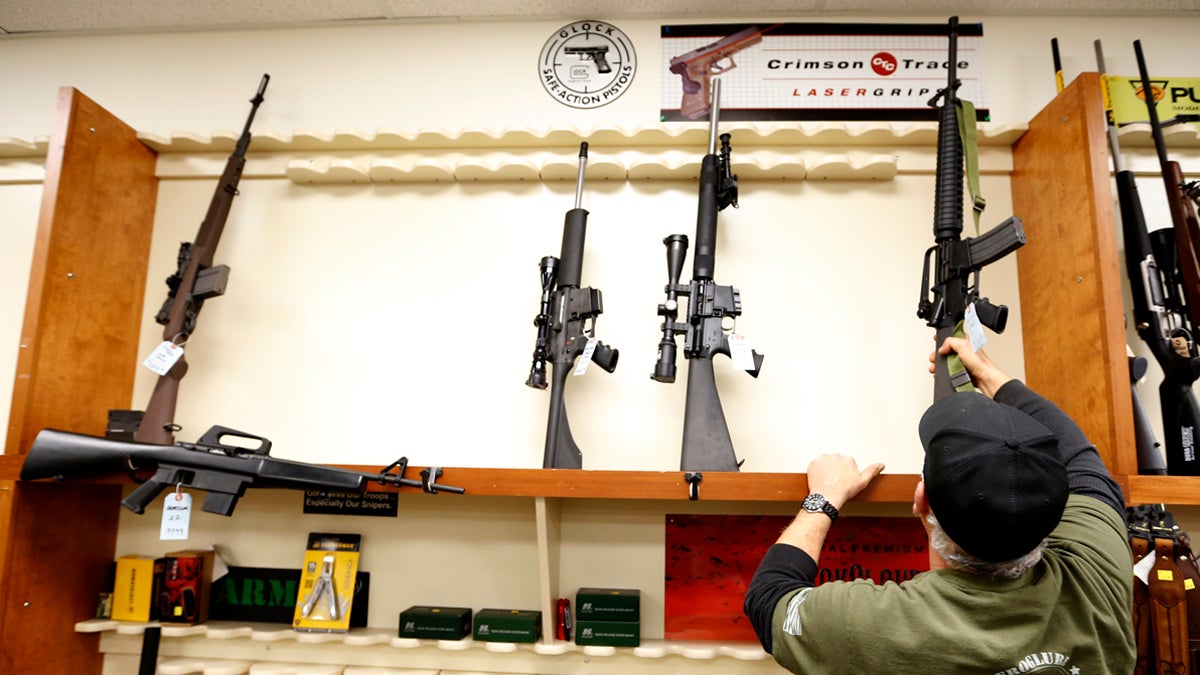Bills revived in Harrisburg lowering standards for gun rights groups to sue cities over local laws

In this file photo, a store manager replaces one of the five used military style rifles onto a rack that usually has more than 20 models for sale in in New Castle, Pa. (AP Photo/Keith Srakocic)
The changes will not, however, prevent Gov. Tom Wolf from vetoing the measures, should they reach his desk.
State legislators are again discussing bills that would make it easier to sue municipalities over local firearms ordinances that conflict with Pennsylvania law.
The measures would require courts to award plaintiffs legal fees, even if they lose the case.
Predecessor legislation had the same provisions for court costs — for pretty much anyone, regardless of whether they own a gun or had even been to the town with the contested rules.
Bills advanced this year, however, provide for a shallower pool of plaintiffs. Gun rights groups headquartered anywhere can still sue over hypothetical harm. But only individuals who live in Pennsylvania and can legally buy a gun can do the same.
Residents of other states would have to be cited under an ordinance to file a lawsuit over it, a point that is not entirely clear in the legislation, but was clarified by Gwenn Dando, chief of staff for state Sen. Wayne Langerholc.
Langerholc, R-Bedford, is the prime sponsor of Senate Bill 5. He and other supporters say the goal is to establish uniformity among state gun laws rather than rules differing among Pennsylvania’s 2,500-plus municipalities. Examples ordinances include bans on firearms in public parks or playgrounds, and requirements gun owners to notify police of a stolen weapons within a day or two.
State Sen. James Brewster, D-Allegheny, says he grappled with these issues while mayor of McKeesport for more than two decades.
Brewster voted in favor of SB5, along with seven Republican lawmakers, on first consideration before the Local Government Committee Tuesday. (The other three Democrats opposed the bill.)
Brewster says he believes these local ordinances violate the Second Amendment and do nothing to address root causes of violence (poverty, addiction, mental illness, etc.) nor dissuade people from illegally possessing guns.
But he also acknowledged the expense and other difficulties already facing local officials who believe they are acting in the best interest of their constituents.
Similar House Bill 671 was introduced by Mark Keller, R-Perry/Cumberland, earlier this month.
It’s nearly identical to SB5, but has an extra provision: municipalities would be off the hook if they repeal contested ordinances within 60 days of getting a notification of intent to sue.
Gov. Tom Wolf would veto both measures if they reach his desk, according to spokesman JJ Abbott.
The Pennsylvania League of Municipalities opposes the bills.
“We believe communities should have the right to restrict, if they so choose, firearms in public parks,” says Executive Director Rick Schuettler. Same goes for municipal buildings, he says, pointing out the ability to do so in schools, courts and state government facilites.
“Municipalities that have adopted lost or stolen ordinances have done so to curb the number of illegal guns in their communities,” Schuettler wrote in a memo spelling out PML’s stance. “[It’s] a concern … best handled with statewide legislation, but until statewide legislation is enacted, municipal leaders are pressed to handle matters locally.”
Legal expenses also are behind opposition by PML as well as the Pennsylvania State Association of Boroughs.
“While we recognize certain aspects of firearms regulation are preempted by the Pennsylvania Uniform Firearms Act, we believe the one-sided legal fees awarded to plaintiffs in this legislation will be used in the same unscrupulous manner as when Act 192 of 2014 was passed,” PSAB regulatory affairs coordinator Ron Grutza wrote in an email.
Lawsuits were filed against several Pennsylvania municipalities (with matters involving Harrisburg and Lower Merion Township still unresolved) and at least 100 more repealed similar ordinances before Act 192 was struck down by the state Supreme Court.
The decision didn’t address the substance of the measure, but focused on the manner in which legislators passed it.
State lawmakers advanced bills with similar intent and form, in a more transparent manner, during the 2015-16 legislative session. Those bills never went anywhere, though.
The Pennsylvania State Association of Township Supervisors hasn’t taken a position yet in hopes Langerholc will address the organization’s concerns, according to assistant Executive Director Elam Herr.
Editor’s note: This post was updated with responses from PML and PSATs.
WHYY is your source for fact-based, in-depth journalism and information. As a nonprofit organization, we rely on financial support from readers like you. Please give today.



